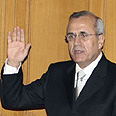Lebanon's president on Tuesday urged the quick formation of a unity government as a response to "threats" from Israel, which has said it will hold the country responsible for any attack by the guerrilla group Hezbollah.
Israeli officials have directed a series of warnings at Lebanon and Hezbollah in recent days, while the Iranian-backed Shiite movement, which is expected to be part of the next cabinet, has also threatened Israel in spiraling rhetoric that has triggered speculation of war.
"The near daily, repeated Israeli threats ... require us to work seriously to secure the internal ranks and accelerate the formation of the national unity government," Lebanon's President Michel Suleiman said on Tuesday, according to a statement from his office.
Hezbollah and Israel last traded fire in 2006 during a 34-day war. The conflict killed some 1,200 Lebanese, mainly civilians, and 158 Israelis, mostly soldiers.
Deputy Secretary-General of the Hezbollah Sheikh Naim Kassem said Tuesday that his organization is always ready "to ward off any aggression by Israel."
Hezbollah's al-Manar television quoted Kassem as saying that the Shiite group "does not believe that Israel's threats are serious, but knows that some day the threats will become serious and is therefore ever vigilant."
Israeli Prime Minister Benjamin Netanyahu on Tuesday played down reports of tensions between Israel and Hezbollah.
'Quickly but not hastily'
Replying to a reporter's question as he visited an Israeli air force base, as to whether he thought the Lebanese guerrillas were seeking to heat up the border situation, he said: "There is nothing in particular going on. There is no war-like atmosphere. I think this is a media storm, nothing more."
On Monday, Netanyahu said Israel would hold Lebanon responsible for any future Hezbollah attack if the group were part of the next cabinet, which Sunni Prime Minister-designate Saad al-Hariri is trying to form.
Hariri was designated to form the government over six weeks ago following the victory of his US-backed, anti-Syrian "March 14" coalition in a June parliamentary election.
He has been trying to forge a unity government including his defeated rivals in the "March 8" alliance, which comprises Hezbollah and its Shiite and Christian allies.
Hezbollah, which has a wide following among Lebanese Shiites, has been part of government since 2005.
Hariri, a billionaire businessman with the political backing of Saudi Arabia, had reached an agreement on the division of seats in the new 30-seat government and was expected to finalize the new cabinet last week.
But his efforts ran into difficulties when Druze leader Walid Jumblatt, one of his main allies, said he would quit March 14, drawing calls from some of Hariri's allies for a review of the seat-sharing arrangement.
Hezbollah and its allies have rejected the idea of changing the agreement.
Hariri, who returned from a week-long vacation on Monday, has yet to comment. He is expected to meet Jumblatt later to continue talks.
MPs belonging to Hariri's Future Movement met on Tuesday and backed the prime minister-designate's efforts.
"The bloc commended the prime minister-designate's determination and his continuing effort to form a national coalition government quickly but not hastily," they said in a statement after the meeting.
















